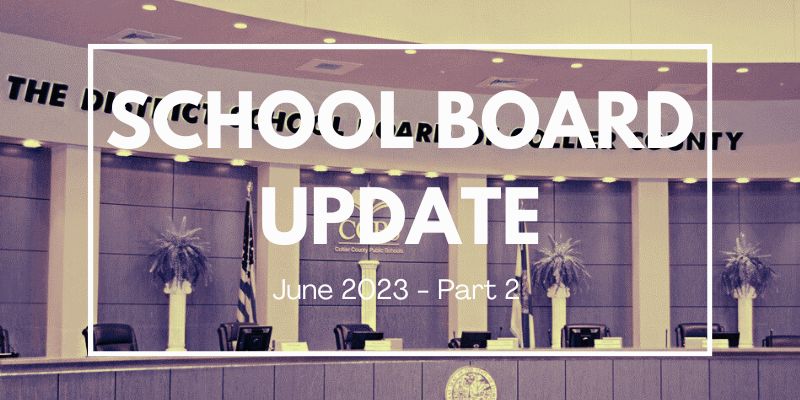
Today’s post begins with updates on Alfie Oakes’ lawsuit challenging the process by which the School Board chose the District’s next superintendent, and the contract Board members signed with Dr. Leslie Ricciardelli. For background on these important events in our community, see my last post.
Moving on to regular Board business, there is an update on the proposed School Guardian program and two other matters of interest. Finally, there is a report on the Board’s consideration of a proposal to provide tele-wellness health services for students in Immokalee and Everglades City. The proposal was controversial and I include several excerpts from public and Board comments.

The Oakes Lawsuit
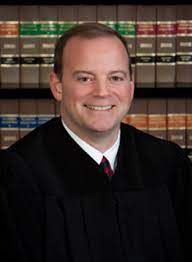
On June 12, Collier County Judge Joseph Foster denied Alfie Oakes’ motion for a temporary injunction to stop it from entering into a contract with Ricciardelli.
In denying the motion, Foster said, “This Court finds that the Plaintiff (Oakes) cannot show a substantial likelihood of success on the merits, and therefore a temporary injunction would not be appropriate at this time.”
That said, “since it is a non-final ruling, that means the case continues, and we will have ample opportunity for the trial court to clarify its ruling,” said Oakes’ attorney Steve Bracci.
For more on why the judge reached that decision and the quote from Bracci, see Oakes school board injunction denied; overall case will proceed; Ricciardelli pact with board inked, WGCU, 6/13/23.
Superintendent’s Contract
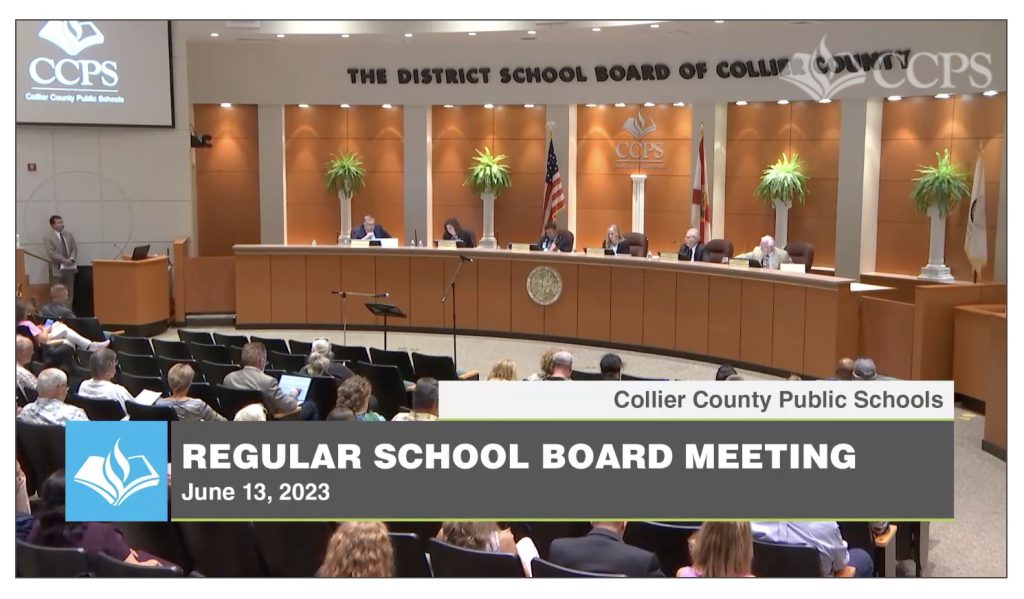
Since the judge did not grant the injunction, the Board proceeded at its June 13 meeting to consider the contract terms proposed by the School Board attorney and debated by the Board at its June 12 Work Session (Consent Agenda Item D2).
The points of contention among the Board members were the contract’s proposed base salary of $305,000 and its three year term.
Base Salary
The minimum salary that had been listed in the job posting was $285,000, and that is what Tim Moshier wanted to offer. He said that would be consistent with several cost-per-student statistics he calculated for other school districts with budgets of similar size as Collier’s.
Erick Carter proposed “to meet in the middle at $295,000” with a 2% increase annually, “providing that she is productive.”
“She’s going to work just as hard if she made $305,000 or if she made $285,000,” Jerry Rutherford said. “She is a consistent worker. And she has a great work ethic, and I’ve enjoyed working with her the last six months.”
“I really don’t think that some of the people commenting really understand what the job of the superintendent is,” Stephanie Lucarelli said, who supported the proposed salary. She pointed out that CCPS is the “number one employer” in the county and that the superintendent has to supervise transportation, food service, health care, security, maintenance, athletics, “and oh, yeah, education,” she added emphatically. “She should be making more than the county manager, the CEO of NCH, and all these other people combined because she’s doing all of that work,” she said.
Kelly Lichter agreed. “This is a huge, huge job,” she said, and Ricciardelli’s institutional knowledge is “invaluable.” “I feel very confident to move forward in this contract the way it is because I know she’s going to do a tremendous job,” she said. “She’s an instrumental part of the team to take us to be number one in the state.”
Contract Term
Rutherford objected to the three-year term, but Carter said he was “firm” on that. “She needs ample time to prove herself, and I don’t think three years is unreasonable,” he said.
Lichter said she had originally been “on the two-year track” but reconsidered. If the District had hired one of the applicants from out of the county or out of state, “No way would they relocate their family and move here on a two-year contract,” she said. “It just wouldn’t happen.”
She pointed out that, unlike contracts with the previous superintendent, the proposed contract prohibited contract extensions before the third year of the contract. That’s “another protection,” she said.
At this point, the School Board attorney pointed out that if the Board intended to change the contract, they would have to go back into negotiations with Ricciardelli. Carter said, “It’s not worth kicking it down the curb for six more weeks,” and Lichter called the question.
The Vote
The proposed contract was approved without changes, and will become effective on July 1. The vote was 3 – 2, with Moshier and Rutherford opposed.
The School Guardian Program
A job description for the new position of School Guardian was approved unanimously without discussion at the June 13 Board meeting. See my last post for background on the School Guardian Program and excerpts from the job description.
FGCU Dual Enrollment Opportunity for CCPS Students
At its June 13 meeting, the Board approved a new dual enrollment opportunity to enable even more CCPS students to shorten the time needed to complete a degree. The two-year agreement with Florida Gulf Coast University (FGCU) is in addition to the existing dual enrollment program currently available to students through Florida SouthWestern State College (FSW).
Dual enrollment is a state program that allows secondary students, including home education and private school students, to take postsecondary coursework and simultaneously earn credit toward a high school diploma, a career certificate, an associate or baccalaureate degree at a Florida public or eligible private institution. Dual enrollment courses are free to students who attend a Florida public college, technical center, or university.
Dual enrollment is one of three options CCPS offers students who are identified as gifted or high-performing. For more on the CCPS High School Advanced Studies programs, click here.
New: Volunteer Advisory Audit Committee
Community members will soon have the opportunity to advise the School Board on financial audit-related matters. Policy 6840, approved at the June 13 meeting, establishes an Audit Committee to be composed of five community members and chaired by a School Board member serving in a non-voting, ex-officio role.
Having approved the policy, the next step will be for the District to communicate the opportunity to community members. Email communications@collierschools.com to sign up for the District’s News + Notes monthly newsletter.
Interested community members must complete an electronic application. Each Board Member will then recommend from the pool of applicants one community member, subject to approval by majority vote of the School Board.
The requirements for the community appointees are:
- At least one with knowledge of school district or government finance.
- At least one who is a current or former Florida licensed Certified Public Accountant in good standing with substantial auditing experience.
- Each committee member must be a full-time resident of Collier County.
- Committee members must be free from conflicts of interest, as defined in the Policy.
Tele-Wellness Health Services

At its June 13 meeting, the Board denied a District Staff request to enter into a contract to provide tele-wellness health services as a pilot program next year to students attending Immokalee and Everglades City schools. (Meeting recording beginning at 4:14:23)
Under the contract, Hazel Health Services would provide tele-wellness visits by phone and/or computer to students on-demand, with licensed, qualified providers for health services. It would also offer follow-up and case management support including in-person services, assistance in navigating the healthcare system/Medicaid, coordination for ongoing wellness support, and coordination with existing school support.
The $99,930 cost to the District of entering into the pilot would have been funded by a government grant. There would also be no cost to the participating students or their families; any tele-wellness visits would be paid for by their insurance and/or by Hazel’s partnership with CCPS.
For more on the program, see attachments to Agenda Item C324, here.
Public Comments
The proposal was controversial. Seventeen people signed up to speak, all but one speaker against it.
Speakers Opposed
The topic brought up many divisive issues, not only in our community, but state- and nationwide. So below are excerpts of the public’s and board members’ comments, to give you a sense of what some of our fellow community members are concerned about.

The first speaker, Patricia Hoover, began. “Once again, parents’ rights are being usurped,” she said (at 4:15). “A parent’s rights are being handed over to the government institutions veiled in the name of health care over the one true God’s creation, our children.” When her allotted time was up, Matt Hoover continued reading from her prepared remarks. “It appears that the scam-demic of COVID created a huge need for mental health to be implemented in our public school system,” he said (at 4:19).
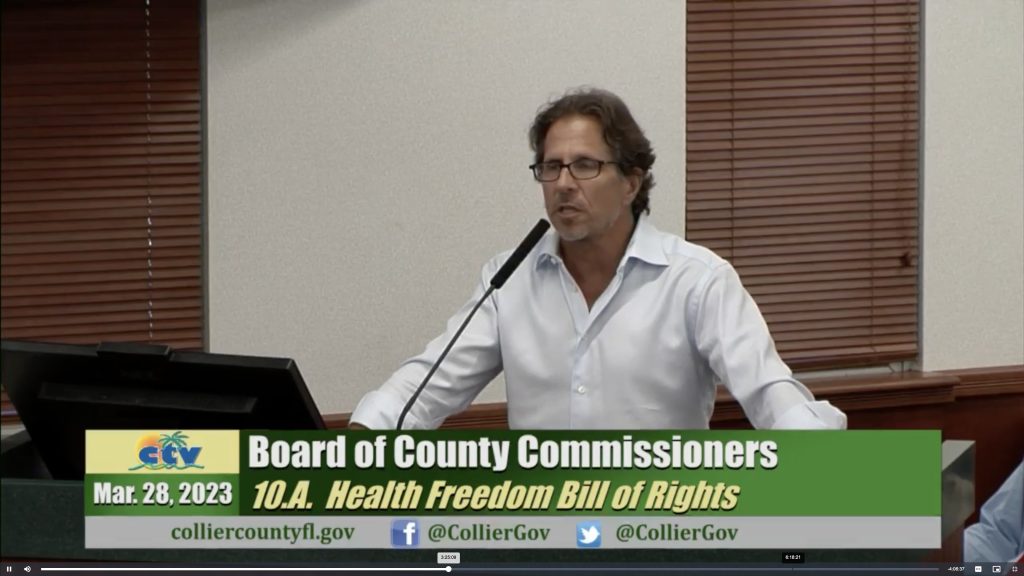
Scott Kiley was to have been the fourth speaker, but was not in the room when his name was called. Sparker’s Soapbox readers may recall that Kiley is a leader of the COVID Tyranny Task Force, which originated the “Health Freedom Bill of Rights” ordinance adopted by Collier County’s Board of County Commissioners in April. (Update: Health Freedom Bill of Rights Resolution and Ordinance, Sparker’s Soapbox, 4/1/23; Collier leaders pass ‘health freedom’ ordinance to protect individual liberties, Naples Daily News, 4/13/23)

Dan Cook spoke next. He began by saying he believed that Kiley was going to “raise into question whether this consent form of Hazel violates the Collier County Health Freedom Ordinance because it doesn’t give informed consent” (at 4:25). Cook is Vice Chairman of the Collier County Republican Executive Committee.
He then went on to object to the fact that Dr. Ricciardelli had signed the proposed contract before the public had the opportunity to give input and before the Board had the opportunity to discuss it. After the public comment period ended, Erick Carter explained that when he was Board chair, it was not uncommon for the superintendent to have signed something before the board meeting. It was done so it would be ready for the chairman’s signature, once the board had given its approval. “It isn’t contractual until the board chair signs it,” he said. “That’s how it’s always been done.” District General Counsel Jon Fishbane also later said the same thing.

Lisa Johnson also spoke against the program. “I am 100 percent against this Hazel San Francisco woke company having anything to do with Collier County,” she said. She, like Cook, questioned the lack of public input before Ricciardelli signed the contract. She also questioned the adequacy of the description of what parents were being asked to consent to (at 4:35). Johnson is Treasurer of the Collier County Republican Executive Committee.
Speaker in Support

Kate Tardif spoke in favor of the program. She said she had served as a Guardian Ad Litem for ten children over a period of ten years, and “they all had mental health needs. They all had needs for services such as … Hazel Health Care provides,” she said. “And I would have been thrilled, and so would their parents have been, to be able to have access to that” (at 4:37).
General Counsel Jon Fishbane

After hearing the public speakers, Fishbane went over what the contract says and the purpose behind it. He said the program was brought to his attention by colleagues who wanted “to provide narrow services to students in Immokalee and Everglades, where kids may not have access to any kind of medical care” (at 4:42).
In response to the allegation that there was no informed consent, he said that before a child can receive treatment, there are multiple documents which require parental consent. “It’s right there in the contract, under Services.”
As to mental health treatment, “Nobody was trying to pull a fast one. It was targeted toward a limited population of persons who really otherwise would not be able to have access,” he said. And again, he said, parental consent would first be required.
Erick Carter

Erick Carter was the first board member to comment. He said he was sympathetic to parents for whom it is a struggle to take time off work to take a child to the doctor, but said, “I would like to investigate the Florida Healthy Kids services that are provided before we move forward.”
Florida Healthy Kids offers government-sponsored health insurance for children between ages 5 through 18. It is one of four health insurance programs under the umbrella brand Florida KidCare that together “provide a seamless continuum of coverage for Florida children from birth through the end of age 18.” The other KidCare programs are Medicaid, MediKids, and the Children’s Medical Services (CMS) Health Plan. (Florida KidCare website)
Later in the discussion, Carter again said he wanted to know more about what was already available, and to revisit the situation with data such as the absentee rates for the students in Immokalee and Everglades City. “If the public can see that, and if they’re astronomical, that may give more light into what we’re dealing with over there,” he said.
Jerry Rutherford
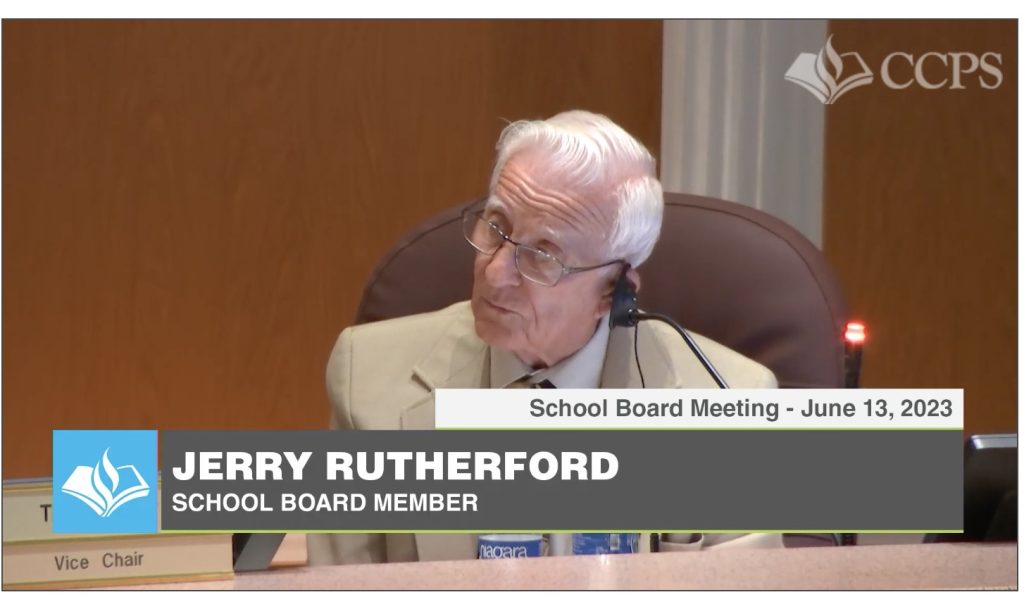
Jerry Rutherford spoke next. He opposed the program. “What is happening is causing everybody to be dependent, not only on the government, but dependent on everybody else,” he said. “I am totally against government control. The government gives us money, and then they get more control over our lives. I don’t like that at all.”
Later, he said that we [the District] can’t provide everything for everybody. “We all came here to work, and we are obligated to take care of our own family. When are they gonna learn to take care of themselves?”
Stephanie Lucarelli

Stephanie Lucarelli said she understood some of the concerns mentioned. But she reminded fellow board members that they have also been told they need to do more for student mental health, and that they need to do everything possible to make all students proficient in the state tests they take.
“We have a lot of children that are in situations where they can’t get into town for services that they need,” she said. “And if they are not well, they are not going to succeed.”
She, like Carter, asked if telehealth services were provided by the Healthy Kids program. She also said that if telehealth services were to be offered by the District, she wanted parents to have the option to listen in or join remotely.
Tim Moshier
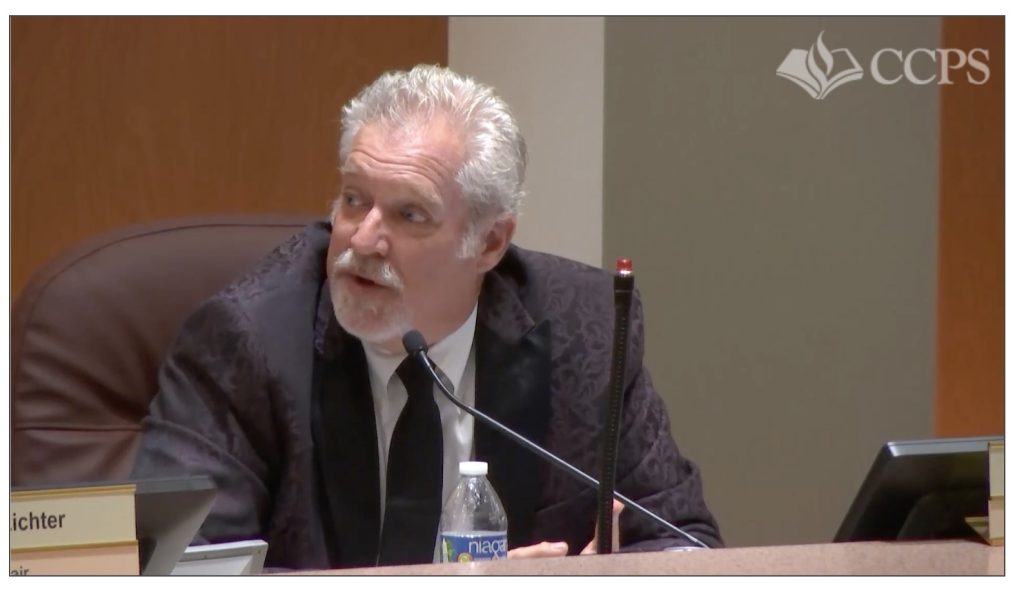
Tim Moshier likened the remote location of Immokalee to that of Everglades City, where he lives. He said that even though there are few local services, mobile healthcare providers, including the Ronald McDonald Care Mobile, come to town. “And if anything comes up, we get people to the hospitals. We can take care of everything,” he said.
He also said he agrees with Rutherford that “we have to be able to take care of ourselves down there.”
Kelly Lichter
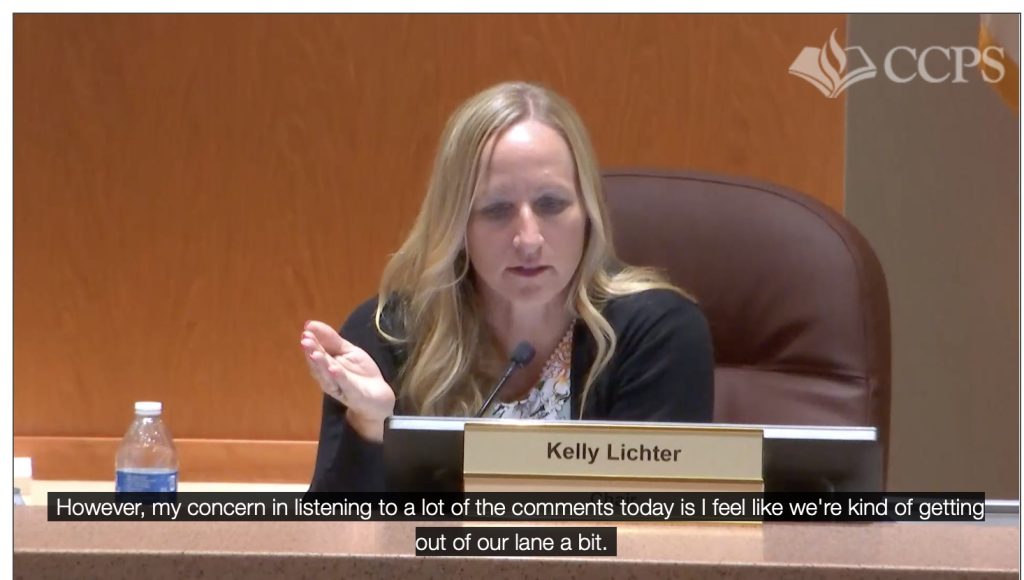
Kelly Lichter was the last Board member to speak. She said that, on the one hand, she sees the benefit for families in Immokalee or Everglades City who don’t have as much access to services.
But, “I feel like we’re getting out of our lane a bit” and “this could be a slippery slope,” she said. Healthcare is the “wheelhouse” of other programs that already exist. “Our wheelhouse is developing academics, knowledge, virtue, character, and our students. I feel like we should rely on the other organizations and … we should stay in our lane.” (at 5:02).
Dr. Elizabeth Alves

Dr. Elizabeth Alves, Chief Academic Officer, next spoke to offer some clarifications. She said the telehealth services were intended to remove barriers to ensure that students have the opportunity to be in school every day and be successful. They would address illnesses like colds that need to be treated immediately, she said.
She also explained that Florida Healthy Kids is an insurance program. It would not provide the facility, the doctor, or the ability to be seen at a point of service when the service is needed.
The Vote
School Board Attorney Alan Gabriel, with the law firm of Weiss Serota Hellman Cole + Bierman, P.L., suggested the Board turn down the contract and continue the item to a later date.
Lichter said even if the contract were brought back, she would not support it, considering the concerns already stated.
The Board then voted 4 – 1 to deny approval of the proposal, with Lucarelli opposed.
